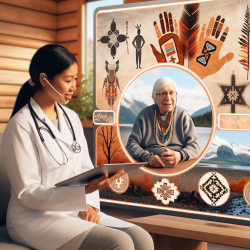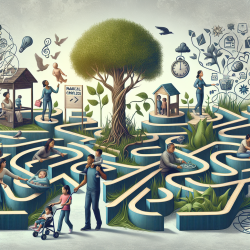Introduction
In the realm of speech-language pathology and online therapy services, practitioners are constantly seeking ways to enhance their skills and deliver culturally competent care. A groundbreaking research article titled PIECES of My RELATIONSHIPS: The Cultural Adaptation of a Biographical Assessment Tool for Indigenous Older Adults in Canada offers valuable insights into creating culturally safe care environments for Indigenous older adults. This blog explores how the findings from this research can be implemented to improve outcomes for Indigenous populations and encourages further exploration in this critical area.
Understanding Cultural Safety
The concept of cultural safety, initially introduced in New Zealand, emphasizes addressing power imbalances and ensuring culturally appropriate care. This approach is particularly relevant for Indigenous populations who have historically faced systemic barriers in accessing healthcare. The research highlights five key themes for adapting mainstream practice tools to be culturally safe for Indigenous older adults:
- Practicing a relational approach to care
- Valuing Indigenous language
- Understanding Indigenous trauma
- Respecting cultural values and understandings
- Addressing systemic barriers to culturally safe care
Implementing Research Findings
For practitioners providing online therapy services, these themes can guide the adaptation of assessment tools and care strategies. By integrating a relational approach, practitioners can foster stronger connections with Indigenous clients, recognizing the importance of community and relationships. Valuing Indigenous language involves facilitating communication in the client's first language and understanding cultural nuances in word meanings.
Moreover, practitioners must be aware of the historical and ongoing trauma experienced by Indigenous populations. This awareness is crucial for creating a trauma-informed care environment that respects the client's lived experiences. Respecting cultural values involves acknowledging Indigenous spirituality and traditional practices, which can significantly impact the therapeutic process.
Encouraging Further Research
The adaptation of the PIECES of My PERSONHOOD tool to PIECES of My RELATIONSHIPS underscores the need for ongoing research and collaboration with Indigenous communities. Practitioners are encouraged to engage in community-based participatory research (CBPR) and work closely with Indigenous elders and language experts to ensure culturally safe practices.
By prioritizing cultural safety, practitioners can contribute to reducing health disparities and improving outcomes for Indigenous older adults. The findings from this research serve as a valuable resource for practitioners seeking to enhance their cultural competence and deliver effective, culturally safe care.
Conclusion
The research on adapting biographical assessment tools for Indigenous older adults in Canada provides a roadmap for practitioners to create culturally safe care environments. By implementing the research findings and engaging in further exploration, practitioners can play a pivotal role in improving the health and well-being of Indigenous populations. To read the original research paper, please follow this link: PIECES of My RELATIONSHIPS: The Cultural Adaptation of a Biographical Assessment Tool for Indigenous Older Adults in Canada.










